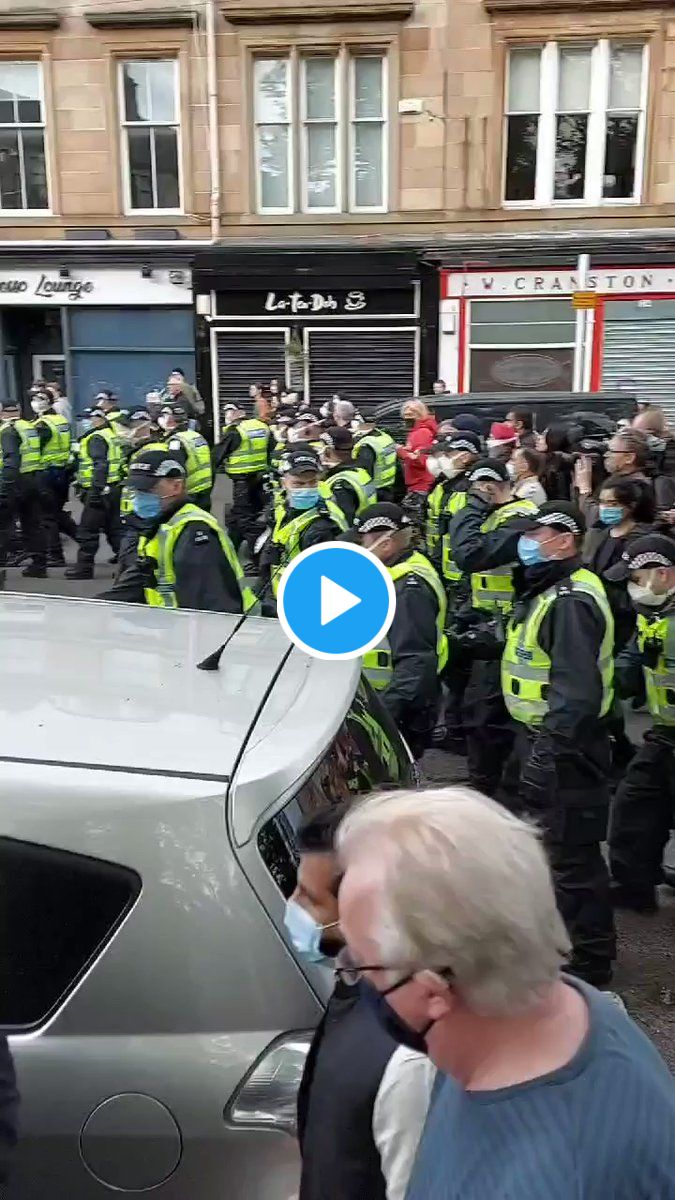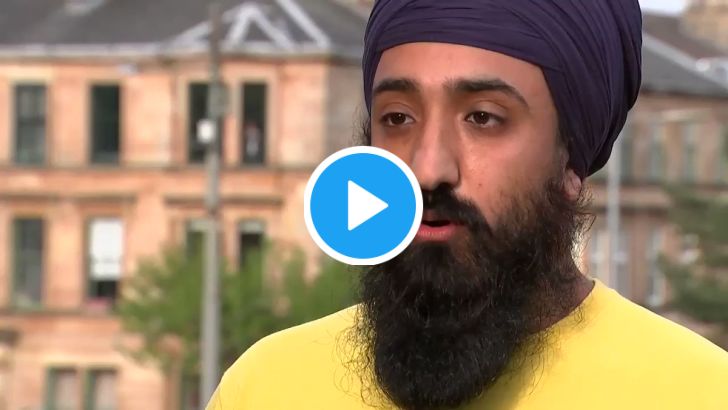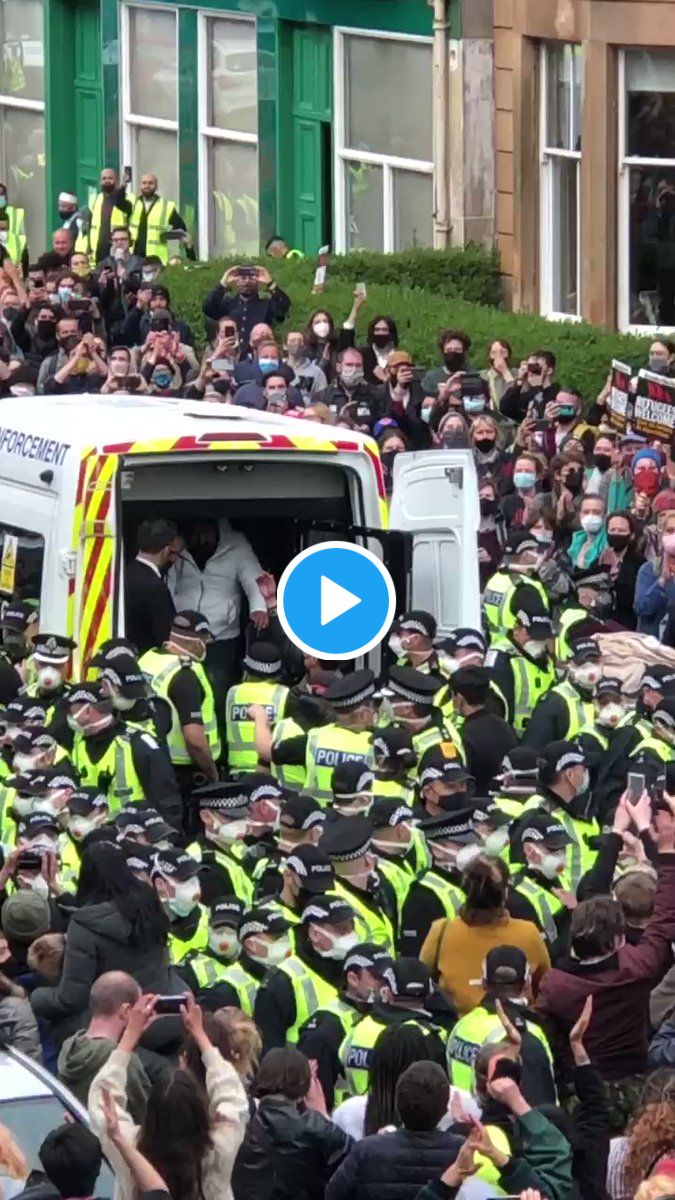Dr. Sharandeep Singh: How Glasgow Protestors Defeated The UK Government And Saved Two Sikhs
As I circled around the throngs of protesters, the atmosphere at the demonstration was joyful and it attracted people from all backgrounds: Sikh, Muslim, Christian, white, Black, young, and old
Dr. Sharandeep Singh
May 19, 2021 | 6 min. read | Opinion
Kenmure Street, in Pollokshields, is a hedge-lined avenue of white sandstone Victorian flats in the leafy southside of Glasgow. It was on May 13, 2021, that the street found itself at the centre of a dramatic showdown with the UK Home Office and the UK immigration system.
The day was already special for the neighbourhood’s large Muslim community as families were preparing for Eid.
Around the same time, a solitary Home Office Immigration Enforcement vehicle had arrived and was prowling the area. It pulled up on Kenmure Street and six enforcement agents bundled out to conduct an all-too-routine unannounced immigration removal.
Within minutes, Lakhvir Singh and Sumit Sehdev, fully complying with instructions, found themselves being led out of their apartment into the cramped, dark cell contained within the van.
Clearly unknown to the Home Office and its agents is that Glasgow is a city that looks out for its own.
Inhabitants of Glasgow are known colloquially as “Weegies”, short for Glaswegian. As one of the major UK cities where asylum seekers and refugees are historically accommodated and embraced as honorary citizens a new term, “Refuweegee”, was coined as a symbol of the city’s big heart.
A nearby neighbour had spotted the van and as he watched the situation unfold, he was spurred to intervene. He is now known as 'Van Man', because, within a split second, he heroically raced out into the street and dove under the axel of the van, gripping onto the undercarriage for eight hours to prevent its departure.
At this point, as my phone was being flooded with messages from activists, I was busily starting my work in Glasgow's West End hospital anaesthetising patients for cancer surgery.
Video footage documents how the protest was started by a handful of concerned neighbours positioning themselves around the van, preventing its onward journey to one of the UK’s immigration detention centres. Person by person stepped onto the street to block its progress, as concerned locals gathered to take a stand.
Some were aware of the identity of the men being detained, but most were simply taken aback by a sense of injustice.
As midday approached, news of the attempted forced removal was spreading. Tweets, Facebook posts, and live videos were quickly being shared amongst WhatsApp networks and activist groups. In a matter of hours, a formidable gathering of concerned neighbours and seasoned activists had formed.
Bizarrely, for what was ostensibly a peaceful, civic gathering, the city’s police were mobilised in large numbers to attend to the scene. Resolute chants rang loudly in their ears, as the crowd sang “These are our neighbours, let them go” and “The people united, will never be defeated”.
By 3 PM, I wrapped up my day’s work and raced across the city. My suspicions had been confirmed that the people captured in the van were my acquaintances Lakhvir and Sumit.
For the past 10 years, I have been an organiser and volunteer within Glasgow’s tight-knit Sikh Sangat and that is how I came to know both, as they had established a long track record of Seva within the community.
Often, too much discourse on immigration is tainted by prejudice and bias, but in these two individuals, I have seen the embodiment of upstanding citizens; hard-working young men, with deep social relations and a passion for charity - for example, helping to feed the homeless on a weekly basis.
I cannot emphasise how well-regarded both individuals are in the area.
For them to have been forced into a small, cramped, dark van and heading for inhumane conditions at one of the UK’s detention centres was an egregious breach of civility and human rights, especially in the middle of a pandemic.
Furthermore, these individuals had been living here for over 10 years and this was their home. It would be unconscionable to be uprooted and sent back to India, where they face not just social and economic hardship, but a severe threat to their life as the pandemic ravages India and the health care system collapses.
As I circled around the throngs of protesters, the atmosphere at the demonstration was joyful and it attracted people from all backgrounds: Sikh, Muslim, Christian, white, Black, young, and old. Young mothers, with babies in tow, could be seen browsing the makeshift refreshments stall of juice, fruit, and sweets.
Meanwhile, Police Scotland was cack-handedly flooding the streets with riot gear – it was over-the-top, to say the least, but the intimidation did not frighten us.
The UK Home Office is the main government ministry that controls immigration, internal security, and borders. It is headed by the Secretary of State, Priti Patel, a politician regarded to be on the right wing of the ruling Conservative Party.
To her opponents, she is considered inept, having already been sacked from the Cabinet in 2017 due to an attempted cover-up of clandestine meetings she had with Israeli politicians whilst on “holiday”. She admitted then that she had fallen below the standards of transparency and openness.
She was welcomed back into government by Prime Minister Boris Johnson to a more senior post, rewarding her for her leading role in the campaign to have Britain exit from the European Union.
Priti Patel’s grandparents hail from Gujarat, and her parents came to the UK, via East Africa, as part of the mass emigration many South Asians had to undertake from the former British colonies. Immigration is written into her family history; so, it is ironic that she is now head of the Home Office, which once paid for advertising vans to drive around London with the words “Go Home or Be Arrested” and which developed a “hostile environment” policy to make life difficult for immigrants in the UK.
She remains dangerously ignorant that the hostility she propagates was exactly what her parents and grandparents would have had to endure upon their arrival.
I spoke to Rashpal Singh Bassi, a Glasgow-based lawyer who told me that “the immigration system in the UK is full of flaws and the UK does appear to disadvantage Indian nationals. Many legitimate routes of applications are closed off because India is on the UK’s “whitelist” of nations, which does not reflect the real political, economic and social dangers that many Indians may be fleeing from.”
Priti Patel not only found herself pitted against peaceful local protesters, but the devolved government of Scotland, based in Edinburgh, was quickly mobilising against the actions of the UK Home Office.
Scotland had just held national elections and the new politicians were being sworn in at the Parliament on the very same day. A pro-independence government had won the election and the immigration raid was being viewed through the prism of opposing governments.
Kenmure Street just happens to be in the constituency of the First Minister of Scotland. Concerned about the deteriorating stand-off, Nicola Sturgeon pleaded with the Home Office to intervene and de-escalate the situation. Nobody picked up her call.
Prominent community leaders and human rights campaigners, spoke eloquently through a megaphone and voiced the sentiments of the community. Well-organised and agile activist networks captured the imagination of the nation, with viral tweets and videos reaching millions of views. A rare multi-party consensus of Scottish politicians arrived on the ground and the protest gripped the national media attention.
Prominent human rights lawyer Aamer Anwar, community leader Mohammed Asif and grassroots activists from ‘No Evictions Network’ pressed the authorities on their options. Either a major police operation was deployed, inevitably requiring force to disperse the peaceful protest or, more appropriately, the individuals were released and UK immigration abandoned its botched operation.
Approaching dusk, the confluence of events risked a major social and political catastrophe if the protest was not resolved before nightfall. Authorities could not gamble with spirits being high and tensions rising in the multicultural heart of Glasgow.
Eventually, the Police Commander yielded and agreed to a settlement.
The detained individuals would be released back into the community custody and the peaceful crowd would disperse. For the first time in recent history, a popular grassroots gathering had compelled the Home Office to do the unprecedented and reverse an immigration removal.
Scores of police officers marched up the street with Lakhvir and Sumit. Following behind was the 1000-strong crowd guaranteeing that the agreement was honoured. On the steps of the local Mosque, the two men turned to the crowd and held their arms up in victory. A ripple emanated through the crowd. The crowd erupted into a stupendous roar of elation as Lakhvir and Sumit emerged from their detention; it was euphoric.
Following the humiliating climbdown, the Home Office doubled down and released a statement calling the gathering of students, elderly and young mums with babies, a “mob”.
Many supine observers might passively conclude that the actions of the protesters were an unlawful gathering and unjust obstruction of the state. However, I hope the electric scenes of Kenmure Street on that fateful day will light the global spark for a thousand similar movements for justice.
Such movements remind us that some rights, some principles, are too precious to be ceded.
Sharandeep Singh is an Anaesthetist for the National Health Service Scotland and is passionate about improving health outcomes for all communities. He is the Trustee of Scotland’s only Sikh advocacy body, Sikhs in Scotland. He also co-founded the award-winning community-led project, The Sikh Food Bank, which served over 150,000 meals to vulnerable people through the pandemic. You can find him on Twitter at @DrSharandeep and on Instagram at @Sharandeep5ingh
Baaz is home to opinions, ideas, and original reporting for the Sikh and Punjabi diaspora. Support us by subscribing. Find us on Twitter, Instagram, Facebook at @BaazNewsOrg. If you would like to submit a written piece for consideration please email us at editor@baaznews.org.







